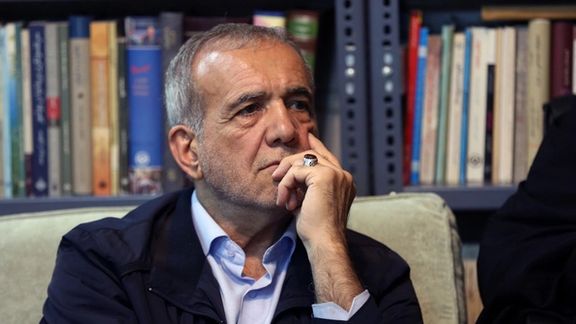Iran's president-elect faced challenges from day one

Iran's President-Elect Massoud Pezeshkian began his challenging journey to the presidency just one day after his comfortable victory in the July 5 runoff election.

Iran's President-Elect Massoud Pezeshkian began his challenging journey to the presidency just one day after his comfortable victory in the July 5 runoff election.
The Iranian parliament (Majles), which must approve his cabinet appointments, went on a 10-day holiday for the Shiite mourning month of Muharram, which began on Saturday.
An Iranian parliamentarian said that after the ten days of mourning, the lawmakers will go on summer holiday and Pezeshkian's introduction to the Majles and his swearing-in ceremony will take place sometime in August. Before that, he needs to officially resign as a member of parliament.
This delay might not be entirely detrimental for Pezeshkian, who previously stated he has no plans or list of cabinet ministers. He now has over a month to formulate a plan and compile a list. So far, none of his campaign advisers, primarily from the centrist Executives of Construction Party and the Development and Moderation Party, seem to have provided him with any plan or list.
In the meantime, it is not clear yet, whether Supreme Leader Ali Khamenei will endorse Pezeshkian's credentials before the mourning period which could well extend to two weeks, or he is going to do it regardless of religious rituals.
On the other hand, on his first day as President-Elect, a news conference with Iranian and foreign reporters planned for Saturday afternoon was cancelled. The news conference was first re-located from a conference center in northern Tehran to an auditorium in south Tehran without giving any reason to the reporters.

While the reporters were making their way from one venue to another, it was announced without giving a reason that the news conference was cancelled. It is not yet clear who arranged the news conference and who cancelled it as Pezeshkian has no staff and chief of staff yet. However, later during the day, pro-reform Emtedad News said that it was cancelled because Pezeshkian had to go to a meeting with Khamenei.
State television reporter Mohammad Hossein Ranjbaran was quoted by Iranian media as saying that during the meeting, Khamenei offered suggestions to the President-Elect. These suggestions may have included advice on addressing questions about foreign policy, including relations with the United States and Europe, and Iran's role in the Middle East.
Some Iranian reporters suspect that the cancellation of the news conference was an attempt to prevent surprises during the meeting with foreign reporters. They believe that those who hastily arranged the news conference intended to throw the inexperienced politician to the media wolves.
During the televised debates, Pezeshkian and other candidates evaded such questions when posed by their rivals. The TV presenters were aware that these topics were off-limits for the candidates, as only Khamenei has the final say in these matters.
Khamenei has assured foreign entities that the new president's tenure will not bring any changes in foreign policy or unexpected surprises for international players. He reiterated in his felicitation message on Saturday that Pezeshkian's mandate is "to continue President Raisi's path" with literally translates into taking no initiative of his own.
Even before the election, the US Department of State said that a change of presidents in Iran will not lead to a change in the country's foreign policy. The DOS reiterated after the elections that “We have no expectation these elections will lead to fundamental change in Iran’s direction or more respect for the human rights of its citizens. As the candidates themselves have said, Iranian policy is set by the Supreme Leader.”
During the weekend, the head of the caretaker government in Iran, Mohammad Mokhber who was visiting Kazakhstan, reassured Russian President Vladimir Putin that no change will occur in Iran's foreign policy as a new president takes office in Tehran.
With all those assurances, Khamenei is likely arranging a series of briefings and introductions for the newly elected president before he dives into the deep end of Iranian politics.